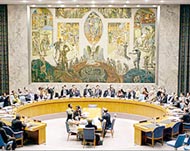China, US face-off on human rights
The recent attempt by the United States to censure China’s human rights record at the United Nations conference in Geneva has met with a predictably curt response from Beijing.

Accusations by Chinese government spokespersons of American “meddling in internal affairs” and an “alternative political agenda” during a United States election year have filled the Chinese airwaves since the US announced its decision on 22 March.
China’s response, raised after a recent US State Department report accused China of “backsliding on key human right issues”, has been to suspend all human rights dialogue between the two countries.
“It is not out of ignorance or true concern for China’s human rights but because of ulterior motives that a certain country has censured China,” said Shau Zukang, the Chinese conference ambassador.
He then refuted the US charges by suggesting China’s human rights situation has improved in the past 12 months.
The critical US report contains numerous charges including China’s use of torture to extract confessions as well as lengthy incommunicado detentions.
Moreover, the report said China was using the umbrella title “war on terrorism” to conduct purges of those seeking independence through peaceful means in China’s Muslim region, Xinjiang.
But Sha Zukang pointed to a recent constitutional amendment as proof of his country’s commitment to human rights.
Vague provision
The amendment, written into the constitution in March during the National People’s Congress, aims to further recognise and safeguard human rights.
Lawmakers and the official press have noted it as an important component in China’s development.
 |
|
Chinese Premier Wen Jiabao |
However, almost 15 years since the Tiananmen Square massacre of June 1989, outside observers remain sceptical as to how much has really changed with regard to China’s human rights situation and what impact the constitutional amendment will have.
Already, the original 1953 constitution guarantees a large number of basic rights including the freedoms of speech, press, association and demonstration, similar in tone to the UN Declaration of Human Rights.
However, it also includes a catch-all clause (Article 54) that specifies it is the duty of citizens, “to safeguard the security, honour and interests of the motherland”, and that they should not commit acts detrimental to these principles.
“Any input that suggests China is moving towards an international level of human rights is welcomed,” said Nick Bequelin of pressure group, Human Rights in China, to Aljazeera.net.
“But the constitution already allows for many rights. Adding a vague provision will not make a difference,” he said.
Control
According to Bequelin, although China may present a much greater image of personal freedom, the fundamentals of the system remain under tight control.
“China is still a one-party state with laws against trade unions and the regular jailing of dissidents. Strong economic growth has only hidden the costs on social transitions and personal freedoms,” he said.
|
“China is still a one-party state with laws against trade unions and the regular jailing of dissidents. Strong economic growth has only hidden the costs on social transitions and personal freedoms” Nick Bequelin,Human Rights in China |
China’s rights record should be seen in the context of its development, said one constitutional legal expert,
Wang Xixin. The law professor and legal adviser to the National People’s Congress is critical of outside pressure groups being too judgmental.
“Human rights in China are focussed on the right to existence and the right to a sustainable development,” he said.
In effect echoing the official line, Wang Xixin drew attention to the fact that both mindsets and legal processes continue to change on this issue and that China, he says, sticks to the principles of international laws.
“I cannot say human rights are perfect in China but as society continues to change, human rights will feature more prominently in lawmakers’ thinking,” he said.
Gradual change
The notion of evolutionary change has been popular in both China and the West where leaders in the mid-90s used the concept as justification for increasing trade despite complaints from activists.
 |
|
Human rights group Amnesty is |
The past year in China has been a mixed bag in terms of human rights progression.
A controversial custody and repatriation system that monitored city dwelling rural migrants was abolished.
But that was overshadowed by the continued jailing of “political dissidents”, and the recent arrest of three editors of a newspaper prominent for its uncovering of government misdemeanors.
Moreover, in an apparent attempt to prove their newfound commitment to human rights, China gave an early release to a number of political prisoners, including one Tibetan nun, Phuntsog Nyidron, who had been in jail for 16 years.
The construction of several new churches in Beijing was also announced.
The fact that all of this coincided with America’s initial call for China’s censorship in the UN and discussion among EU members as to whether a 1989-imposed arms embargo should be lifted raised a few eyebrows.
Influence sought
“This was obviously an attempt to influence the US decision in the UN,” said Ben Carradus of human rights group, Amnesty International.
“The fact that China plays such hostage-politics with prisoners is a sign that there has been no progress on human rights at all,” he continued.
 |
|
The US has led calls for the UN |
However, despite concerns from activists who say that China has yet to live up to its rhetoric, lawyers are pinning their hopes on the increasing stress the government is placing on the constitution.
Essentially an expressional rather than directional contract, the constitution fits the mould of the nation’s founding fathers, who created a judiciary that was subservient to, as opposed to independent of, government control.
“The new generation of lawyers is looking at the law and constitution in terms of legal reform, in terms of challenging what exists. The older generation would never do this,” said Beijing lawyer Zhang Xingshui.
Protest letters
As head of an independent pressure group, Open Constitution Initiative, his stance reflects a more aggressive approach on the part of intellectuals to challenge the government over abuse of constitutionally protected rights.
Usually this manifests in the form of open letters addressed to government leaders protesting individual situations, the results of which are often mixed.
In a recent case, political internet essayist Du Daobin remains incarcerated despite thousands of signatures protesting his right to free expression.
“The constitution contains all the ingredients for safeguarding rights but it needs a legal environment in which this can be recognised.
|
“We are experiencing a very important social phenomenon as individuals are beginning to understand social rights and bring cases against the state citing the constitution” Wang Xixin, |
“Judges’ decisions involving cases where the constitution is cited are either too politicised at present because of the lack of an independent judicial system, or such cases are never held because many judges are simply too afraid and ill informed of the constitution’s meaning to apply it,” added Zhang Xingshui.
Even so, argues Wang Xixin, the changes to the way the constitution is viewed by decision makers will be helped by the increasing publicity.
“We are experiencing a very important social phenomenon as individuals are beginning to understand social rights and bring cases against the state citing the constitution,” added Wang Xixin.
Although Wang Xixin could only name such example, he did reveal that a new constitutional review board with appointed judges, modelled on the French system, is being discussed.
Exactly how it would work has not been revealed. Nor is it clear how much the government would allow human rights, such as the freedom of expression, to flow unchallenged.
“It is a slow process,” said Zhang Xingshui. “We have to act carefully.”